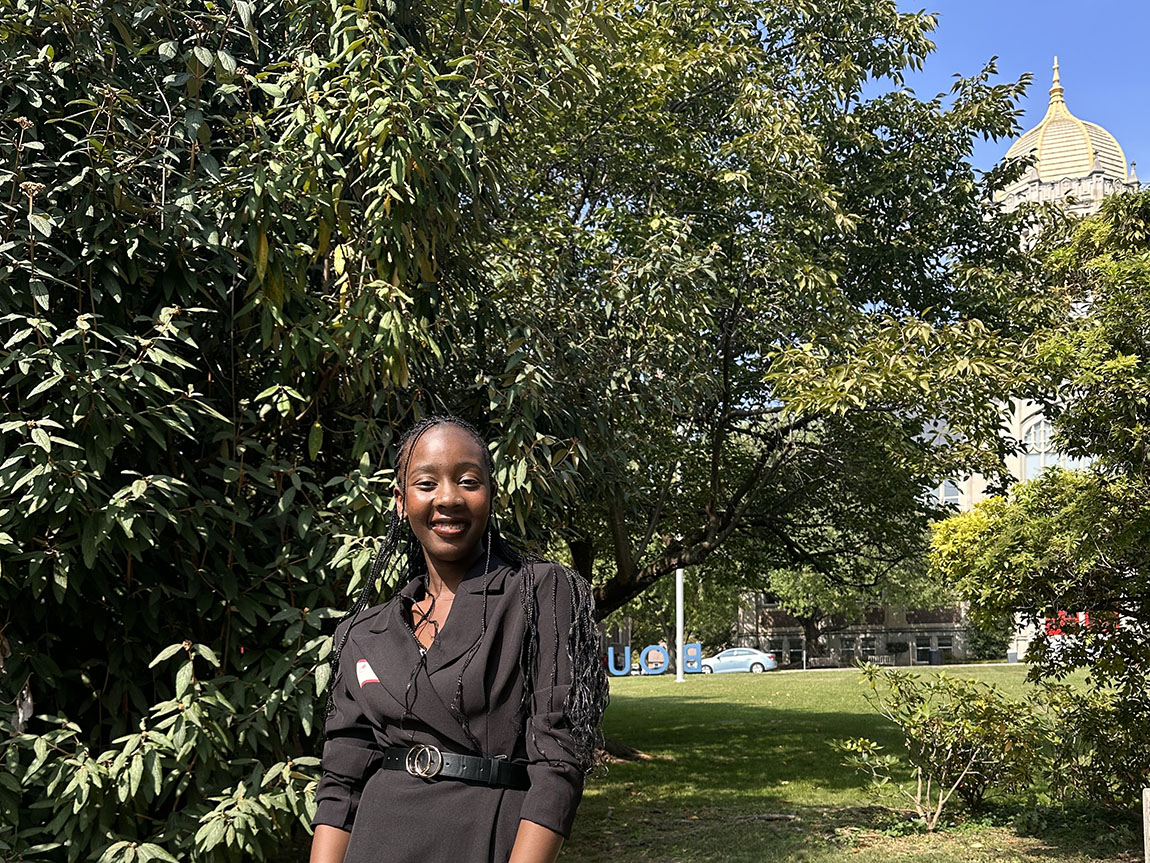Summer Research: Ednah Asiema ’26 Examines Women’s Roles in China and Korea
Asiema, a pre-law international studies major, is looking at both history and today’s society to understand why gender inequality still exists and how it connects to politics and tradition.Monday, July 21, 2025 09:11 AM
 Ednah Asiema ’26
Ednah Asiema ’26More than 70 Muhlenberg students are conducting research this summer — about 60 on campus, about 10 more remotely, and a handful of others through other institutions.
Research challenges students to apply what they’ve learned in the classroom, hone their discipline-specific skills, and make an impact in their field. Learn more about Muhlenberg’s transformative summer research program.
Ednah Asiema ’26
Hometown: Coatesville, Pennsylvania
Major: International studies (political science and anthropology minors, pre-law)
Describe your summer research.
My research, supervised by [Assistant Professor of Modern Chinese History] Anh Le, looks at how traditional Confucian values and strict government control in China and Korea have shaped the way women are expected to behave, especially when it comes to marriage, family, and work. I’m especially interested in the idea of “leftover women,” a term used to describe unmarried women in their late 20s or older who face social pressure to get married even if they are highly educated and successful.
I’ll compare how both countries, despite having different governments, use similar cultural values to control women’s roles in society. By looking at both history and today’s society, I hope to understand why gender inequality still exists and how it connects to politics and tradition. This research has broader social implications, as it will help raise awareness about women’s rights and could support future efforts to create fairer societies.
“I’m drawn to research because it allows me to deeply explore complex global issues and uncover the root causes behind social inequalities. It’s a way to connect theory with real-world impact and contribute to meaningful change.”
Why are you interested in research generally and in this project specifically?
I’m drawn to research because it allows me to deeply explore complex global issues and uncover the root causes behind social inequalities. It’s a way to connect theory with real-world impact and contribute to meaningful change.
This particular project is important to me because it combines my academic interests in international studies, political science, and human rights with a topic that highlights how gender roles are shaped by both history and political power. By comparing [China and Korea], I want to understand how different political systems use cultural values to either maintain or adapt gender expectations. I’m especially interested in how state policies reinforce gender norms, and what that means for women’s rights, autonomy, and equality in the workplace and in society.
This research aligns with my passion for advocating for human rights and understanding how power structures affect people's lives. I hope it will prepare me for future work in human rights policy and law and help me contribute to efforts that challenge inequality globally.
What are the most challenging and rewarding parts of your research?
The most rewarding part of my research has been gaining deeper insight into how political systems and cultural traditions shape gender roles, especially in societies I’ve studied through my international studies and political science courses. In Modern East Asia, a previous course taught by [Professor] Le, topics such as Confucianism, authoritarianism, and such were often talked about, inspiring the topic of my research. It’s been meaningful to connect academic theory with real-world issues like gender inequality and the “leftover women” phenomenon. I’ve learned so much already, and it’s helped me grow both intellectually and personally, as it is work I take pride in.
The biggest challenge has been keeping up with the amount of reading and making sense of complex, overlapping historical and political contexts in a limited amount of time. Another challenge is navigating the sensitivity of the topic, especially when discussing gender expectations and state influence while making sure I’m representing different perspectives accurately and respectfully. Still, the process has been incredibly worthwhile and continues to motivate me.
“This research experience is shaping my future goals by pushing me to engage more deeply with communities and issues beyond my immediate background. It’s made me more aware of how cultural values and government systems impact people’s lives in ways that are often overlooked.”
How is this experience shaping your understanding of what you want to do in the future?
This research experience is shaping my future goals by pushing me to engage more deeply with communities and issues beyond my immediate background. It’s made me more aware of how cultural values and government systems impact people’s lives in ways that are often overlooked. I’ve become more interested in social justice and policy work, and it’s strengthened my desire to pursue a law degree and eventually a career in international relations, where I can advocate for human rights and help address global inequalities.
At Muhlenberg, Asiema is a student assistant at the Institute for Religious and Cultural Understanding, a peer tutor, and a member of BergVotes, the South Asian Student Association, and the International Students Association.
